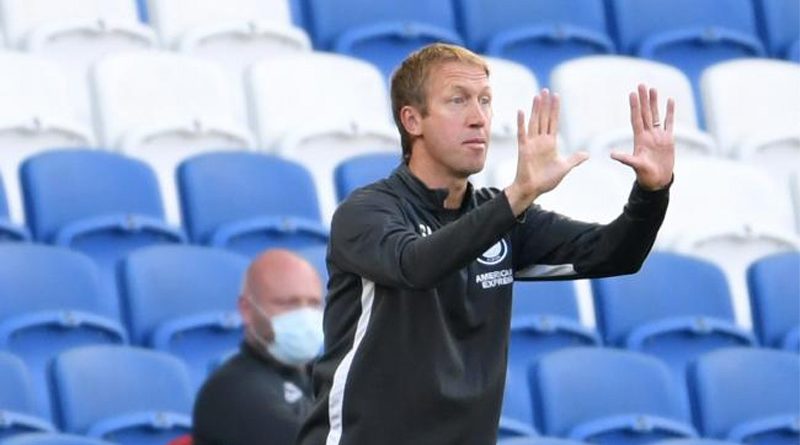Possession should not be king for Graham Potter and Brighton
How many times since Graham Potter took over as Brighton manager have you marvelled at the Seagulls’ possession statistics? Keeping the ball is undeniably one of the most important aspects of Potterball and something which the Albion boss values highly.
Which is perhaps where Brighton have been going wrong. Given how much Brighton’s possession football is talked about, it might come as a bit of a surprise to learn that of the Albion’s five wins in 2020, four of them came when they had less of the ball than the opposition.
When Brighton beat Arsenal 2-1 at the Amex in June, they had 41% possession. Against rock bottom Norwich City two weeks later, it was a 1-0 victory with 42% possession.
The win on the final day of the 2019-20 season at Burnley was earned with 46% possession and the weekend’s 2-1 success at Aston Villa came with 45%.
Brighton’s only win this calendar year in which they dominated possession was the 3-0 hammering of a woeful Newcastle United at St James’ Park when they recorded 53%.
Keeping the ball is very well and good, but at the end of the day you have to do something with it or else it becomes as pointless as the Pope’s testicles. The Premier League do not award bonus points for having 60% possession.
September 21st 2019 was a case in point. On the same afternoon Manchester City stuck eight past Watford, Brighton recorded a higher possession figure than the Citizens, having 71% in a 0-0 draw at Newcastle.
Yes, City may be able to call upon an array of attacking talent that the Albion can only dream of. But the point stands that possession does not make prizes as Bruce Forsyth kind of once said; it is how you use it which counts. City used theirs to score eight times, Brighton used theirs to score zero times.
Speaking of City, Pep Guardiola’s side recorded 66% possession against Tottenham Hotspur on Saturday on their way to a 2-0 defeat. When a journalist pointed this out to Jose Mourinho, saying, “Man City had the ball for 90 minutes”, Mourinho replied with, “They can take the ball home, I take the three points.”
When the Premier League returned in June, Graham Potter introduced a slight change to the Albion’s playing style – there was now less focus on possession and more on what happened when Brighton did have the ball.
Let us remind you of some of Brighton’s ghastly results over January and February which plunged the Albion into the Premier League relegation battle.
There was the 1-1 home draw with Villa (55% possession for the Albion). The 3-1 defeat at Plucky Little Bournemouth (65% possession). The 1-1 draw with Watford (67% possession). And, worst of the lot, the 1-0 loss to Crystal Palace (67% possession).
Before lockdown, the Albion were on a run of two wins in 18 Premier League games; coincidentally, the exact same form which cost Chris Hughton his job.
Post lockdown, Brighton won three games out of nine and picked up 12 points. As already noted, those three victories came in games in which the Albion had less of the ball.
And their possession stats in the three draws? 34% at Leicester City, 32% at Southampton and 63% against Newcastle. The Rachel Rileys among you will have already deduced that 11 of Brighton’s 12 lockdown points came in matches where they were second-best in terms of possession.
At some point during the three month break in the 2019-20 season caused by lockdown, Potter seemed to have an epiphany with regards to the fact that winning games via a little bit of pragmatism is a good thing.
The adjustment ultimately kept Brighton in the Premier League. Potter deserved a lot of credit for it; far too many managers are wedded to their particular philosophy and would rather go down with their ship than change tack.
Ultimately, that is what did for Chris Hughton when he refused to budge from 4-3-3, even though everyone could see it had caused Brighton’s form to collapse in spectacular fashion.
Had Hughton been able to admit in February or March that he had got the switch from 4-4-1-1 wrong rather than in late April with the prospect of Championship football looming large, there may not have been such a hairy end to the season. Hughton might have even kept his job.
Despite the very obvious improvement in results over the final nine games of the 2019-20 once Potter had changed tack, Brighton returned to a possession, possession, possession approach in 2020-21.
One win from the opening eight fixtures was the outcome. And whilst the Albion may have had their fair share of bad luck in there – hello penalties for Manchester United and Crystal Palace – drawing at home to West Bromwich Albion and Burnley are poor results for any Premier League side, no matter what Potter may try and say about Brighton supporters’ expectations.
Villa away was the first match this season in which the Albion have had less of the ball than their opponents – Brighton even dominated against Chelsea and Spurs – and yet it resulted in a 2-1 win against opponents who came into the game fifth in the Premier League and having already won 7-2 against champions Liverpool and beaten Arsenal 3-0 at the Emirates.
A clear pattern has emerged regarding Albion wins in 2020 – they occur when they have less of the ball. Which leaves one question – did Villa dominate possession because they were better with the ball than Brighton or because Potter has again adjusted the Albion’s approach, just as he did post-lockdown?
Hopefully, it is the latter. Brighton pick up results when they are less bothered about keeping the ball incessantly and more concerned about what they actually do with it.
If Potter has again realised that, it is good news for the Albion going forward. Give me a side that wins one game in three with 40% possession over one who records 60% every week but is successful once in eight. 2020 has shown us that possession does not need to be king for Graham Potter and Brighton.




